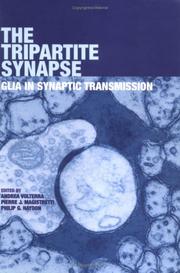| Listing 1 - 4 of 4 |
Sort by
|
Book
ISBN: 0387794913 9786611927196 1281927198 0387794921 Year: 2009 Publisher: New York : Springer,
Abstract | Keywords | Export | Availability | Bookmark
 Loading...
Loading...Choose an application
- Reference Manager
- EndNote
- RefWorks (Direct export to RefWorks)
Due to their lack of electrical excitability, astrocytes, a subtype of glial cell, have long been neglected as active participants in intercellular communication within the central nervous system. Astrocytes, however, possess a diverse assortment of ion channels, neurotransmitter receptors, and transport mechanisms that enable them to respond to many of the same signals that act on neurons. Astrocytes in (Patho)Physiology of the Nervous System provides readers with a comprehensive description of the physiological roles astrocytes play in regulating neuronal activity and their critical involvement in pathophysiological states of the nervous system, including gliomas, Alexander's disease, and epilepsy. This book will be particularly useful for researchers, students, and workers in the field of neurobiology and cell biology. About the authors: Vladimir Parpura, M.D., Ph.D holds both a medical degree, awarded from the University of Zagreb in Croatia in 1989, and a doctorate, received in Neuroscience and Zoology from Iowa State University in 1993. He has held faculty appointments at the Department of Zoology and Genetics, Iowa State University and the Department of Cell Biology and Neuroscience, University of California Riverside. He is presently an Associate Professor in the Department of Neurobiology, University of Alabama Birmingham. His current research focuses on understanding the modulation of calcium-dependent glutamate release from astrocytes. Philip G. Haydon, Ph.D received his doctorate from the University of Leeds, England in 1982. He has held faculty appointments at the Department of Zoology and Genetics, Iowa State University, the Department of Neuroscience at the University of Pennsylvania, and has recently moved to Tufts University School of Medicine as Professor and Chair of the Department of Neuroscience. His research focuses on the role of astrocytes in the regulation of synapses, neuronal networks and behavior as well as how these glial cells contribute to neurological disorders.
Cytology. --- Neurobiology. --- Neurosciences. --- Astrocytes --- Nervous system --- Biological Science Disciplines --- Neuroglia --- Nervous System --- Natural Science Disciplines --- Anatomy --- Cells --- Disciplines and Occupations --- Physiology --- Central Nervous System --- Medicine --- Human Anatomy & Physiology --- Health & Biological Sciences --- Neuroscience --- Neurology --- Pathophysiology --- Cytopathology --- Astrocytes. --- Cytopathology. --- Pathophysiology. --- Glia (Neurology) --- Medicine. --- Cell biology. --- Biomedicine. --- Cell Biology. --- Organs (Anatomy) --- Neurosciences --- Cell biology --- Cellular biology --- Biology --- Cytologists --- Neural sciences --- Neurological sciences --- Medical sciences
Digital
ISBN: 9780387794921 Year: 2009 Publisher: Boston, MA Springer US
Abstract | Keywords | Export | Availability | Bookmark
 Loading...
Loading...Choose an application
- Reference Manager
- EndNote
- RefWorks (Direct export to RefWorks)
Histology. Cytology --- Physiology of nerves and sense organs --- Neuropathology --- neurologie --- cytologie --- histologie --- neurobiologie
Book
ISBN: 9780387794921 Year: 2009 Publisher: Boston MA Springer US
Abstract | Keywords | Export | Availability | Bookmark
 Loading...
Loading...Choose an application
- Reference Manager
- EndNote
- RefWorks (Direct export to RefWorks)
Due to their lack of electrical excitability, astrocytes, a subtype of glial cell, have long been neglected as active participants in intercellular communication within the central nervous system. Astrocytes, however, possess a diverse assortment of ion channels, neurotransmitter receptors, and transport mechanisms that enable them to respond to many of the same signals that act on neurons. Astrocytes in (Patho)Physiology of the Nervous System provides readers with a comprehensive description of the physiological roles astrocytes play in regulating neuronal activity and their critical involvement in pathophysiological states of the nervous system, including gliomas, Alexander's disease, and epilepsy. This book will be particularly useful for researchers, students, and workers in the field of neurobiology and cell biology. About the authors: Vladimir Parpura, M.D., Ph.D holds both a medical degree, awarded from the University of Zagreb in Croatia in 1989, and a doctorate, received in Neuroscience and Zoology from Iowa State University in 1993. He has held faculty appointments at the Department of Zoology and Genetics, Iowa State University and the Department of Cell Biology and Neuroscience, University of California Riverside. He is presently an Associate Professor in the Department of Neurobiology, University of Alabama Birmingham. His current research focuses on understanding the modulation of calcium-dependent glutamate release from astrocytes. Philip G. Haydon, Ph.D received his doctorate from the University of Leeds, England in 1982. He has held faculty appointments at the Department of Zoology and Genetics, Iowa State University, the Department of Neuroscience at the University of Pennsylvania, and has recently moved to Tufts University School of Medicine as Professor and Chair of the Department of Neuroscience. His research focuses on the role of astrocytes in the regulation of synapses, neuronal networks and behavior as well as how these glial cells contribute to neurological disorders.
Histology. Cytology --- Physiology of nerves and sense organs --- Neuropathology --- neurologie --- cytologie --- histologie --- neurobiologie

ISBN: 0198508549 Year: 2002 Publisher: Oxford Oxford University Press
Abstract | Keywords | Export | Availability | Bookmark
 Loading...
Loading...Choose an application
- Reference Manager
- EndNote
- RefWorks (Direct export to RefWorks)
| Listing 1 - 4 of 4 |
Sort by
|

 Search
Search Feedback
Feedback About UniCat
About UniCat  Help
Help News
News